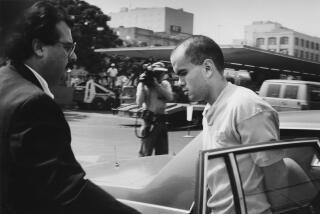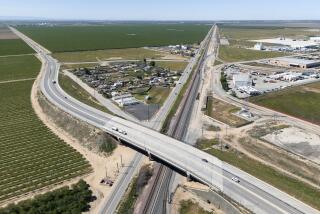Crackdown Urged on Illegal Street Vendors : Sales: Ernani Bernardi’s proposal, prompted by complaints from residents, is backed by police but criticized by a deputy city attorney as possibly unconstitutional.
Los Angeles City Councilman Ernani Bernardi proposed Tuesday that police be given the authority to seize and dispose of pushcarts, vehicles and merchandise belonging to street vendors arrested for illegal sales.
Bernardi said his office has been urged by numerous community and business leaders in Pacoima and Sylmar to crack down on illegal street sales of prepared and fresh food, clothing, jewelry and other items.
The proposal, backed by police but criticized by a deputy city attorney as possibly unconstitutional, would help police enforce laws prohibiting illegal street sales. Under current law, vendors are usually not arrested because police are required to seize their merchandise and store it for safekeeping or evidence, said Sgt. Gary Merrifield of the police division that patrols the east Valley.
“We just don’t have the manpower to spare four to five hours packing food into refrigerators,” Merrifield said. “If we had to store all the food we could seize, we’d have to have a storage area as big as a city block in no time.”
As a result, police usually just cite vendors or issue a warning and order them to move. The violations can include operating a business without a license, preparing food in the open air, posing a nuisance by blocking a sidewalk and failing to abide by zoning regulations.
The vendors are particularly noticeable in the heavily Latino areas of the East Valley in Bernardi’s district.
“We get citizens complaining all the time about the vendors making the area like Tijuana,” Merrifield said. Last Saturday, he led a sweep that resulted in 10 street merchants being cited and three dozen more being warned and rousted from the area.
Merrifield said the Bernardi proposal would “put needed teeth in the vendor law” by allowing police to turn seized merchandise over to nonprofit agencies, such as groups that feed the homeless. “That would really get the vendors’ attention,” he said.
But Deputy City Atty. Alice Hand said Bernardi’s proposal, which is subject to City Council review, might be a violation of due process. “Off the top of my hand, it doesn’t sound legal,” she said.
Hand said the only parallels to what Bernardi is proposing are laws that permit confiscation of property--including cars--involved in drug trafficking before the owners are convicted. “I’d be surprised if selling food on the street would rise to the same level as drug trafficking in the minds of judges being asked to weigh suspending due process,” Hand said.
Asked about Hand’s concerns, David Mays, Bernardi’s chief deputy, said the councilman introduced the idea because the Police Department has said it is “the only way to control the vendors.”
The first test of Bernardi’s plan will come Tuesday when he will ask the council to direct the city attorney’s office to prepare an ordinance calling for the confiscations. Councilwoman Joan Milke Flores, who represents the Harbor area, seconded Bernardi’s plan.
The drew fire from Councilman Michael Woo. Street vendors, if properly regulated, can be a colorful addition to the city’s street life, said Woo, who sees the vendors as sympathetic figures and “small capitalists.”
“They can be an amenity,” Woo said. “In San Francisco and New York City, you can buy orange juice and hot dogs from street vendors. There’s not something inherently heretical, unhealthy or unsafe about them.”
On his own initiative a year ago, Woo established a task force to devise a plan for regulating vendors by limiting their numbers in certain areas and allowing them to flourish in special districts.
It’s unrealistic to expect that the city can stop street vending, Woo said.
Under current city laws, flowers and hot dogs are among the only items that can be legally sold on the streets. Flower vending is allowed in the city’s central business district and hot dog sales are permitted if local health codes are met.
More to Read
Start your day right
Sign up for Essential California for news, features and recommendations from the L.A. Times and beyond in your inbox six days a week.
You may occasionally receive promotional content from the Los Angeles Times.






